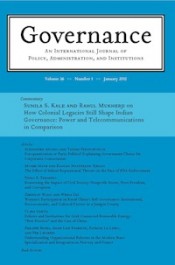Book reviews: Eurolegalism, intergovernmental cooperation
In the current issue of Governance, Rachel Cichowski of the University of Washington reviews Eurolegalism: The Transformation of Law and Regulation in the European Union by Daniel Kelemen. “A fascinating read,” says Cichowski, which examines “the move toward a more adversarial legalistic mode of governance” across Europe. Read the review. And Michael Tatham of Humboldt University reviews Intergovernmental Cooperation: Rational Choices in Federal Systems and Beyond by Nicole Bolleyer. Tatham says that the book “fills an important research gap . . . [with] an unusual mixture of detailed case study analyses and rigorous conceptual work.” Read the review.
How 19th-century legacies shape today’s knowledge economies
In the current issue of Governance, Darius Ornston of the University of Georgia examines how two ostensibly similar countries — Denmark and Finland — have followed different paths to development of a knowledge economy. In Denmark, the emphasis is on investment in training; in Finland, on research. Why the difference? Divergent responses to the “nineteen century challenges of industrialization and nation building,” Ornston argues, have led the two countries “to react to twenty-first century challenges in very different ways.” Read the article.
The difficult life of anti-corruption agencies
In the current issue of Governance, Agnes Batory of Central European University examines the troubled lives of anti-corruption agencies in new member states of the European Union. Whether these agencies can achieve the power and independence promised in law hinges crucially on three key factors. “The deck is strong stacked for political control and against agency autonomy,” Batory says. “If a strong agency is in fact created, the most likely reason is the intention to highjack it from the outset.” Read the article.
Africa: Different electoral systems, different effects on trust
In the current issue of Governance, Wonbin Cho of Sungkyunkwan University examines how the electoral systems of sub-Saharan nations affect citizens’ support for government institutions. Majoritarian and proportational representation (PR) systems operate on public attitudes in different ways, Cho says. In this region, PR systems are better at boosting trust, because they address concerns about representation more effectively, and this is the main preoccupation of sub-Saharan electorates. Read the article.
Journal Citation Reports: 15th year in top ten
How fear of blame undermines service networks
In the current issue of Governance, Donald P. Moynihan uses the response to Hurricane Katrina to examine how a preoccupation with blame avoidance affects the performance of public service networks. Organizations are often forced to participate in such networks, Moynihan says, and more concerned about extra-network reputation than goodwill with their partners. “The Katrina case,” Moynihan says, “underscores the negative consequences of blame avoidance for the functioning of networks.” Open access to the article.
Explaining fiscal policy during economic crisis
In the current issue of Governance, Klaus Armingeon of Bern University examines the fiscal policies pursued by many advanced democracies during the first phase of the economic crisis, in 2008-09. The policies purused by these countries varied considerably, Armingeon shows. Unified governments were more likely to respond with expansionary policies. Others, with less policy flexibility, sought to blame international organizations for contractionary policies. Read the article.
